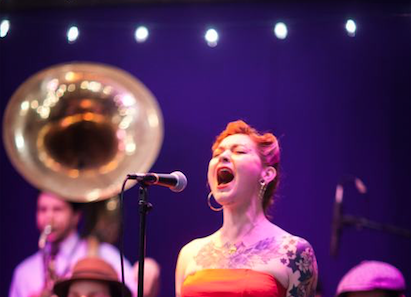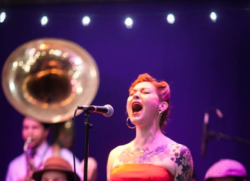NOLA 300 Music
Child’s Play
Of all the choices that young people make, they almost never regret the music
Published: September 3, 2018
Last Updated: March 22, 2023

Meschiya Lake
Picture it: Piedmont, South Dakota, a green and grassy stop at the foot of the Black Hills best known for being close to some place else — Rapid City, some old missile silos and Deadwood, yes, that Deadwood, of Wild West fame.
A girl walks into a bar. The Elk Creek Steakhouse & Lounge features live music on Friday and Saturday nights. On this weekend in 1989, there’s a singing contest. First prize: $500.
Meschiya Lake, age 9, talks her way onto the bandstand. Forget the steaks. Look who’s sizzling now:
I go out walkin’ after midnight
Out in the moonlight
Just like we used to do
I’m always walkin’ after midnight
Searching for you . . .
Who can say no to a voice as big as Patsy Cline’s singing a country & western staple that Cline made famous?? Lake wins the money and a job — performing two songs every weekend night.
Cut to New Orleans, 2018. Lake, now a well-seasoned songwriter and recording artist, is on the bandstand at the Chickie Wah Wah club on Canal Street. She’s belting out jazz and blues classics with a big helping of country—“You Belong to Me,” “Hey, Good Lookin’,” and maybe the saddest Hank Williams of all:
Did you ever see a robin weep
When leaves begin to die?
Like me, he’s lost his will to live
I’m so lonesome I could cry
Tonight, the Black Hills seem to be rising over Canal Street. Lake gets a standing ovation, two bouquets of roses, and a shy hug from piano wizard Tom McDermott. This is their last show together before she takes her act to Europe full-time.
Cue the closing credits — it’s a Hollywood ending. The little girl who made good all those years ago is now a popular and mature artist — and she’s still proving the power of old-time country & western songs she learned in childhood. Songs that musicians are exposed to as children have a profound effect on their artistic contributions later in life. Other factors help shape their work — teachers, family, friends. But songs are like Google Maps in calculating which path young performers ultimately take. On the public radio program Music Inside Out, we ask our guests to describe the songs they loved growing up. The answers are sometimes surprising and always revealing. It’s the part of the interview they like best.
Lake, for instance, attributes the intensity of her singing to yet another genre of music she embraced as a school girl: “I take some of my punk rock roots into it,” she said in May. “That kind of rawness.”
Hardcore songs like “I Against I” by Bad Brains impressed Lake as a ’tween. She also loved the gloomy-but-danceable post-punk of Joy Division and The Cure. Remember, You-oo-ooo soft and only, You-oo-ooo lost and lonely, You-oo-oooo just like heaven? Lake uses the energy and cadences of British punk when reaching for the big notes.
Opera helped Lafayette songwriter David Egan understand the emotional punch that a great song needs. “What I’m getting at is the element of catharsis,” he said in 2014. “It’s a standard which I cannot always hit, but it’s something that I like to go for in a soul ballad.”
Egan, who died in 2016 at the age of sixty-one, wrote soul, blues, and R&B music, often with his creative partner Buddy Flett. Joe Cocker and Etta James sang his songs. But music-makers in New Orleans seemed more simpatico—Johnny Adams, Rounder Records producer Scott Billington, and, most frequently, Irma Thomas. She may be his greatest interpreter. Thomas sang three of Egan’s songs on her 2006 Grammy Award–winning album After the Rain. She then sang yet another Egan original on her 2008 follow-up, Simply Grand.
Born in Shreveport, Egan grew up in what he called a “symphony family.” They also loved the Puccini opera Madame Butterfly, which he described as “heavy stuff.” Of course it is. The beauty, the suffering, the arias!
“The music and the words and the pure emotion work to a point where it just makes you have kind of an outflow of emotion as a listener,” he said. “It also happens in rock ’n‘ roll and blues — a connection to the heart. When Tom Petty says, ‘Here comes my girl,’ and you just want to kick something or put your fist through a window—not in anger necessarily—but just in joy. Just, like a slap-your-mama moment, like, ‘God, he’s got it!’ Sometimes when I get that sense, I know I’m onto something.”
“Even Now” is one of Egan’s triumphs. Thomas and Walter “Wolfman” Washington recorded a rare duet of the song for Washington’s 2018 release My Future Is My Past:
Even now—I still love you
Sometimes I wonder how
But I’m wishing you only the best
Yes, I guess—we’re even now
Before taking the stage name “Walter,” Edward Joseph Washington III grew up singing gospel songs in New Orleans in the 1940s and 1950s. In his area of Central City, most everyone went to church—even gang members like him.
“My nickname was ‘War-War,’” he said in 2016. “I used to fight a lot. By me being small, the cats were trying to pick on me. I had to really be crazy. I would pick up anything, just to keep them off me.” He brought that fighting spirit to music, facing down sidemen in the neighborhood: “I was warring on all of them, [saying],‘Okay, come on.’”
That’s mighty tough talk from a member of The True Loving Four. Washington played guitar as the quartet sang songs like “It’s a Wonder (What God Can Do),” “Amazing Grace,” and “John the Revelator,” which straddles gospel and the blues: Tell me who’s that writing? John the Revelator wrote the book of the seven seals . . .
Washington later played with the R&B star Lee Dorsey and Johnny Adams before assembling his own band. Now, at seventy-four, he’s earning the best notices of his career. He credits the guitar as divine intervention.
“Yes indeed, I believe that’s what the Lord wanted me to do,” Washington said. “When I started playing guitar—I would sleep with my guitar. I believed, if I slept with it, all that was going on with that instrument would come to my head. I thought the guitar would be my Tooth Fairy.”
Multi-instrumentalist Don Vappie knew he’d be a musician when he was eight years old. That’s when he heard “Liza, All the Clouds’ll Roll Away” by Chick Webb and His Orchestra. The song inspired him to learn banjo, mandolin, guitar, and bass.
And yet Vappie’s not-so-secret-love is funk, which he’s also been playing since childhood. Vappie says both styles require improvisational space so musicians can play concurrently and still have their say. “For the funk to happen, everybody can’t be busy,” he said in 2012. “Relax.”
So, Vappie—who performed some of Joe “King” Oliver’s most difficult arrangements at this year’s New Orleans Jazz and Heritage Festival—is also a disciple of Charles Wright & the Watts 103rd Street Rhythm Band. He can play their 1970 single “Express Yourself” on banjo, guitar, mandolin, and bass.
It’s all in the timing. Read the lyrics slowly and the song gets real funky, real fast:
Whatever you do, do it good
Whatever you do, do it good
It’s not whatcha look like
When you’re doing what you’re doing
It’s whatcha doing when you’re doing
Whatcha look like you’re doing.
Express yourself
Express yourself
Of all the choices that young people make, they almost never regret the music. That’s because the songs mean more. They offer pluck and emotional release, spiritual inspiration and a chance to feel as funky-cool as the next guy. When our guests talk about the songs they loved as children, they’re grateful.
Gwen Thompkins is host of the public radio program Music Inside Out.
